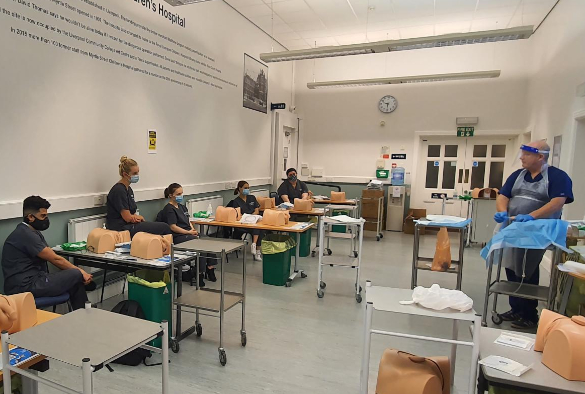
Medical students taking part in clinical skills training (Sep 2020)
The University is continuing to manage the process of welcoming staff back to campus. Many of our buildings are now COVID-secure and a significant amount of work is ongoing to ensure the safe transition of selected groups of staff, as well as students and visitors, back to campus at the right time.
Over the last few months lecturers have been preparing their teaching to provide flexible module delivery that is as interactive, engaging and inclusive as possible. There will be a mixture of in-person teaching delivered on campus, on-demand pre-recorded lectures and online live interactive sessions with the majority of teaching scheduled to begin the week commencing Monday, 12 October.
However, face-to-face teaching has already begun on campus for Medical, Nursing, Dentistry and Allied Health Professional students.
The University’s Head of Nursing, Dr Vicky Thornton explains some of the measures and procedures that have been put in place specifically for nursing students to enable them to have face-to-face teaching to develop clinical skills during the current pandemic. Additional measures are in place for students on clinical programmes given they undertake placements
This is one of many examples of responses to subject specific requirements and is illustrative of the University’s approach of working with departments to implement measures which are appropriate to the discipline.
“Student nurses have been attending clinical skills session since the end of September. An integral part of these sessions, and similar sessions for Medical, Dentistry and Allied Health Professional students, is face-to-face teaching.
In order to make this a safe process for students and staff we have put strict measures in place and have organised bubbles of 6 or 8 students and 2 staff. This meets the regulations in terms of number restrictions for each room. Bubbles have been organised where at all possible around households. An extra member of staff acts as a runner to provide support to the staff, where needed, and to undertake the checks for the students when they arrive and can support students as and when required.
Prior to attending campus students must complete a health declaration/risk assessment form and submit this to the staff running the session. If the form alerts staff to a potential risk from the student they are asked not to attend and they are directed towards the Covid-19 information on the University website. Support is also offered to the relevant student and their regular contact maintained with their academic advisor to monitor their health and well-being.
On arrival to campus the runner checks each student in separately in the foyer of the department. This includes running through their form as a double check and taking their temperature. If their temperature is above 37.8C the student will be sent home and directed to the university website. Should this happen then we shall keep in touch with the student remotely to ensure their well-being is carefully monitored. Once these checks are completed, we then ask the student to sanitize their hands and they are then taken to the skills area, which will have been cleaned thoroughly- including all equipment- by the lecturers.
Students enter the area in single file to reduce risk of spread. The skills area has a dedicated space for donning and doffing of personal protective equipment incorporating a clean and dirty space. A one-way system has been organised which the student must follow in order to remain safe and protect other students and staff. The clean area has two different stations – 2 metres apart- to allow for an efficient, safe but speedy process of donning PPE.
Prior to starting the sessions we remind students of the social distancing rules in place at the University to ensure consistency of approach by everyone involved in clinical skills teaching. Students and staff wear face coverings at all times. To ensure inclusivity we also have vizors to ensure all students are able to interact with the sessions. During the session, staff are able to provide close supervision and support for the students and ensure that they are able to learn and practise the new clinical skills safely and in an environment which facilitates practical teaching effectively. This means that when the students then go onto their placement they are better prepared to practise these clinical skills on their patients.
Where appropriate equipment is cleaned during teaching sessions. However, each student is given a piece of equipment to use, for which they are responsible during the taught session to avoid the risk of cross infection or contravening social distancing rules. The windows in the skills room remain open at all times and the air conditioning is not used. At the end of the session students take off their PPE in the dirty area and then remove their gloves once outside the room and the student then sanitizes their hands again prior to leaving. This process is supervised by the two lecturers with strict observation of the one way system maintained at all times.
Although there has been a period of adjustment, particularly for staff and returning students, we have enjoyed the opportunity to attend the campus and facilitate/take part in these sessions. The students have said that they feel more confident attending placement and working with patients having had the chance to learn and practise these skills in a safe environment too. They also really appreciate the chance to see their lecturers and the lecturers feel this as well.”